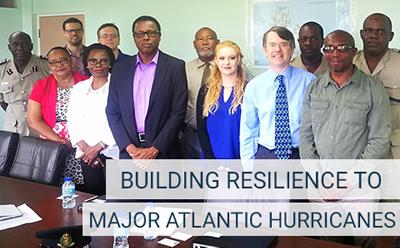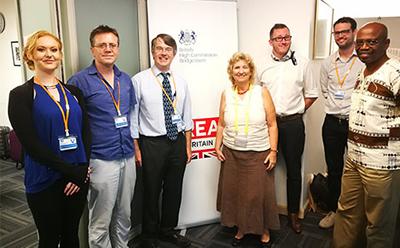
Read more on the evidence informed policy making
Learn more from Gavin Cistigan, Public Policy|Southampton Director about the evidence informed policy making and the role of universities

I spent last week on a Caribbean island. But I wasn’t on holiday, I was working for the University. How on Earth did that happen?
2017 was a desperate year for Caribbean hurricanes, the costliest on record in terms of devastation, and the first in which two Category 5 hurricanes made landfall. Bob Marsh, a professor in physical oceanography who has studied the ocean conditions which generated the hurricanes, wondered if there was anything that the university could do with its many areas of research expertise, to look at long term resilience. With a small grant from the University’s Southampton Marine and Maritime Institute, he assembled an interdisciplinary team from across the university.
And my role? Well, the team quickly determined that they wanted to work in collaboration with the government of a Caribbean country, but wanted some support to make those links. Discussions with the Commonwealth Secretariat suggested that Antigua & Barbuda might be a good country to focus on – Barbuda had felt the full force of Hurricane Irma. Using contacts I have in the UK Foreign Office, I set up a meeting with the High Commissioner of Antigua & Barbuda in London, Karen-Mae Hill. She was extremely enthusiastic – not just about the project, but about developing links between her country and the University of Southampton. She came to Southampton for the day to discuss possible areas of collaboration. On one thing she was very clear – this project could not be done from the UK. A team would need to visit Antigua & Barbuda over the course of a number of days. She offered to make her staff available to set up a visit programme, an offer we gratefully accepted.
And so the ideas for the visit began to take shape. Amongst the group of eight, we found a week when five of us could make the trip, and began to plan. The aim was to meet a mixture of politicians and civil servants, people working in public bodies and agencies, NGOs, aid agencies and research institutes. We knew that some meetings could be arranged in advance, and others would be developed on the go, based on recommendations. Just before we set out, one of our number fell ill, so it was just four of us that headed off to Gatwick in the early hours of a Saturday morning.
It was a fascinating week, for so many reasons. Some things I expected. The inside of Government buildings was as bland in Antigua as anywhere else. The beaches are stunning. It was too hot to wear a tie (but I did anyway). There’s reggae music everywhere. Other things came as a surprise, though they probably shouldn’t have. Being a small country, with a total population around a third the size of the city of Southampton, people really knew and had met their politicians and officials. There is no local government (with the important exception of the island of Barbuda) – so the national government is responsible for both policy and delivery of services. And a significant proportion of the population listen to national radio. I ended up giving two radio interviews during the visit and several people we spoke to subsequently had heard them.
So bringing evidence into policymaking in a small country has a different feel to it – it’s faster, more immediate, and with fewer layers of decision-making. That said, the issues of resources, of balancing priorities, and of public acceptability are the same as they are everywhere. And of course, politics plays its part. The 2017 hurricane seasons left Antigua with only minor damage, but the infrastructure of Barbuda was almost totally destroyed. Barbuda, with a population of less than two thousand, has some elements of devolved administration via the Barbuda Council, and relations between the Council and the national Government are not always harmonious. This in turn has affected both the repair work on Barbuda, and how that work is perceived.

The group deliberately routed back to the UK via Barbados, for a meeting with the British High Commission there. Currently the High Commission in Bridgetown covers UK interests across several countries in the region, including Antigua & Barbuda, although there are plans to reopen a permanent British presence in Antigua some time in 2019. We were able to emphasise our research and education interest in Antigua and the wider region, and hopefully position the University of Southampton as a key partner going forward.
So what were the outcomes of our week in the sun? Well, we have developed closer ties with both Government departments and agencies (such as the Meteorological Office and the National Office for Disaster Services). We have identified some areas for future research collaboration, both in disasters and in the emerging problem of Sargassum seaweed, which since 2011 has washed up in huge quantities on beaches throughout the East Caribbean, posing a major threat to ecosystems, tourism and public health. There are new opportunities to partner with the University of the West Indies, the National Parks Agency and an international research institute with a base in Antigua & Barbuda. There are opportunities for PhD projects and undergraduate field trips in oceanography. Both the Antiguan and British governments know of our expertise and interest. And it’s likely that our findings will contribute to one or more research articles, as well as the PhD thesis of one of our number.
All in all, not a bad week’s work.
Gavin Costigan
Director, Public Policy|Southampton

Learn more from Gavin Cistigan, Public Policy|Southampton Director about the evidence informed policy making and the role of universities

Catch up with past articles from researchers at the University of Southampton